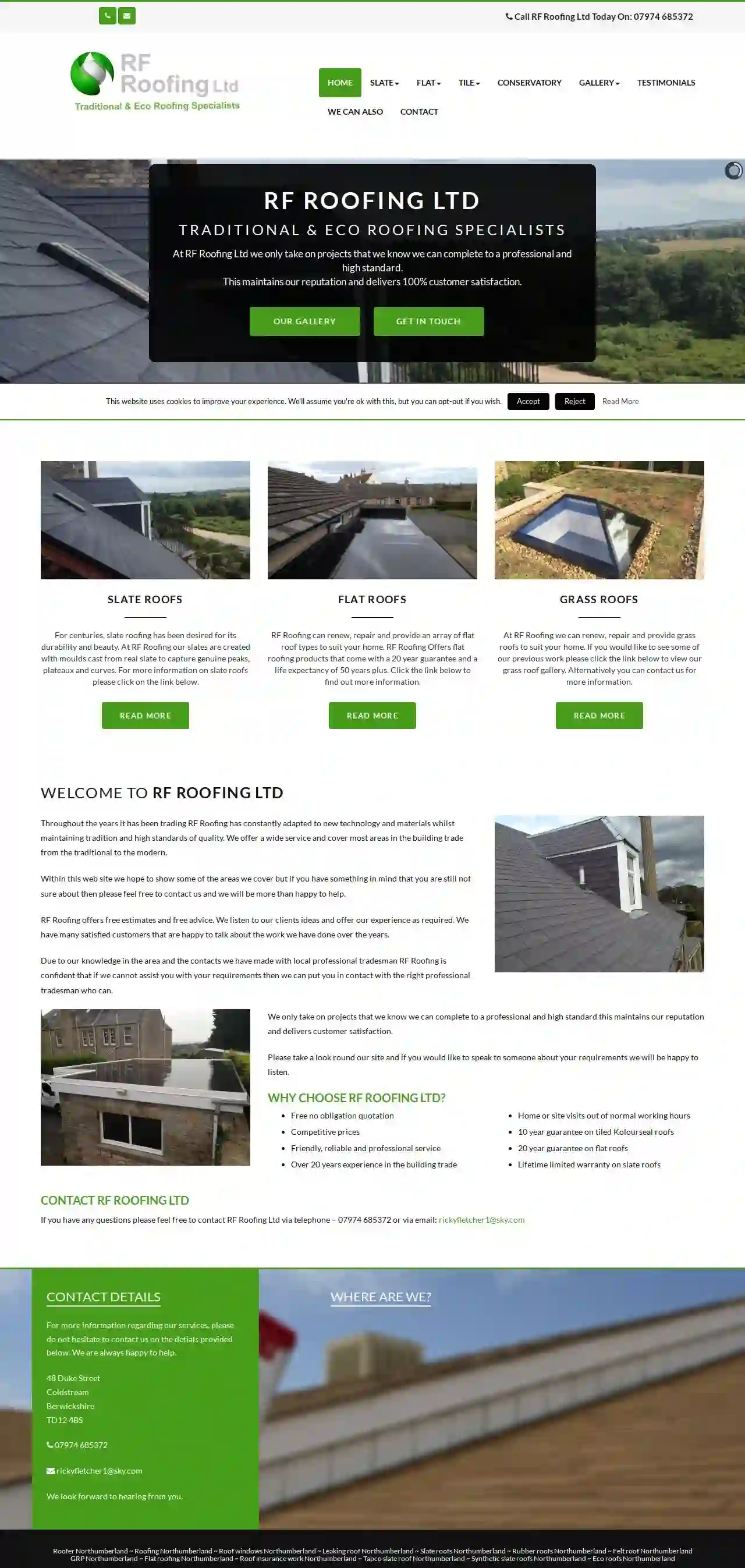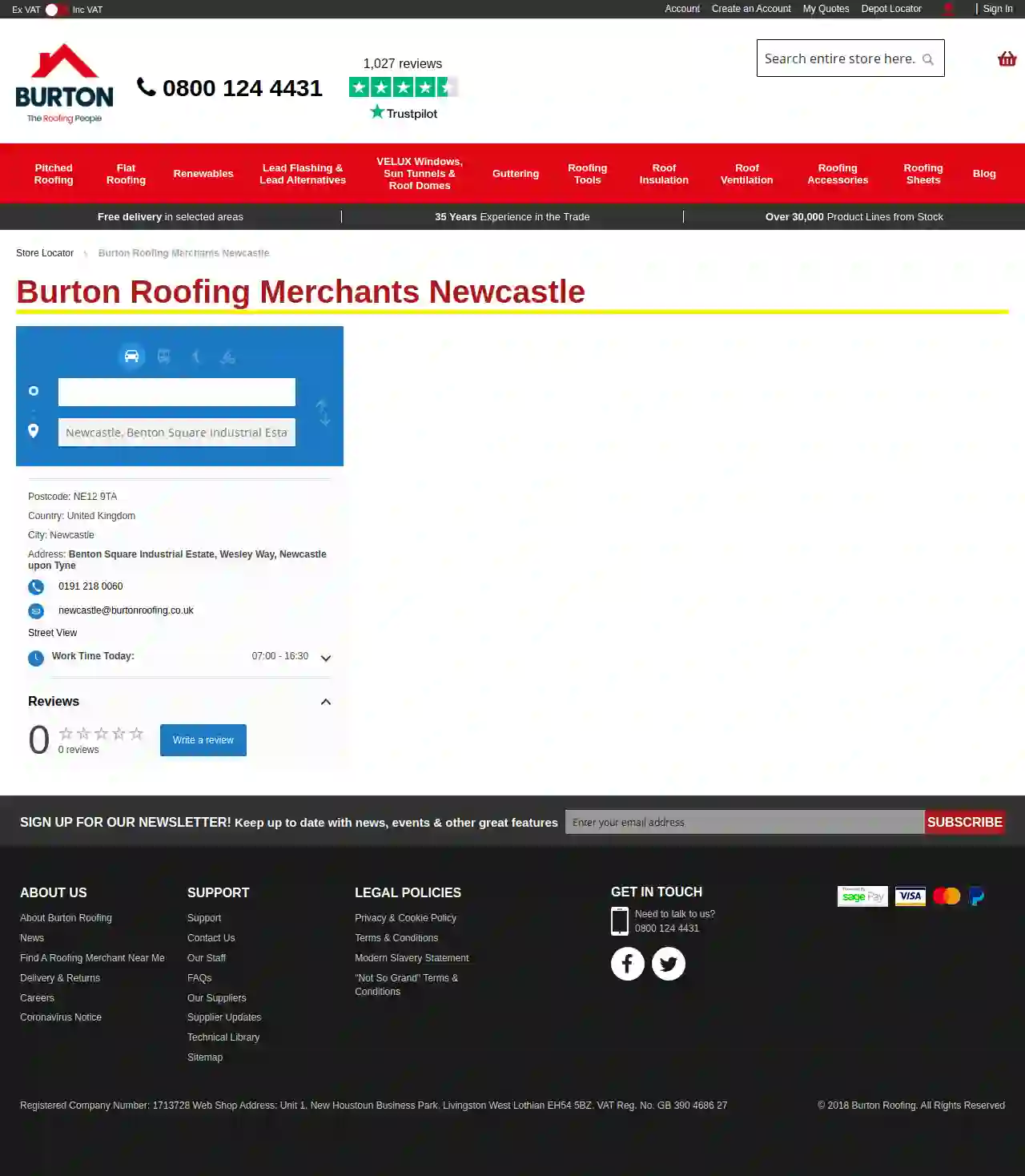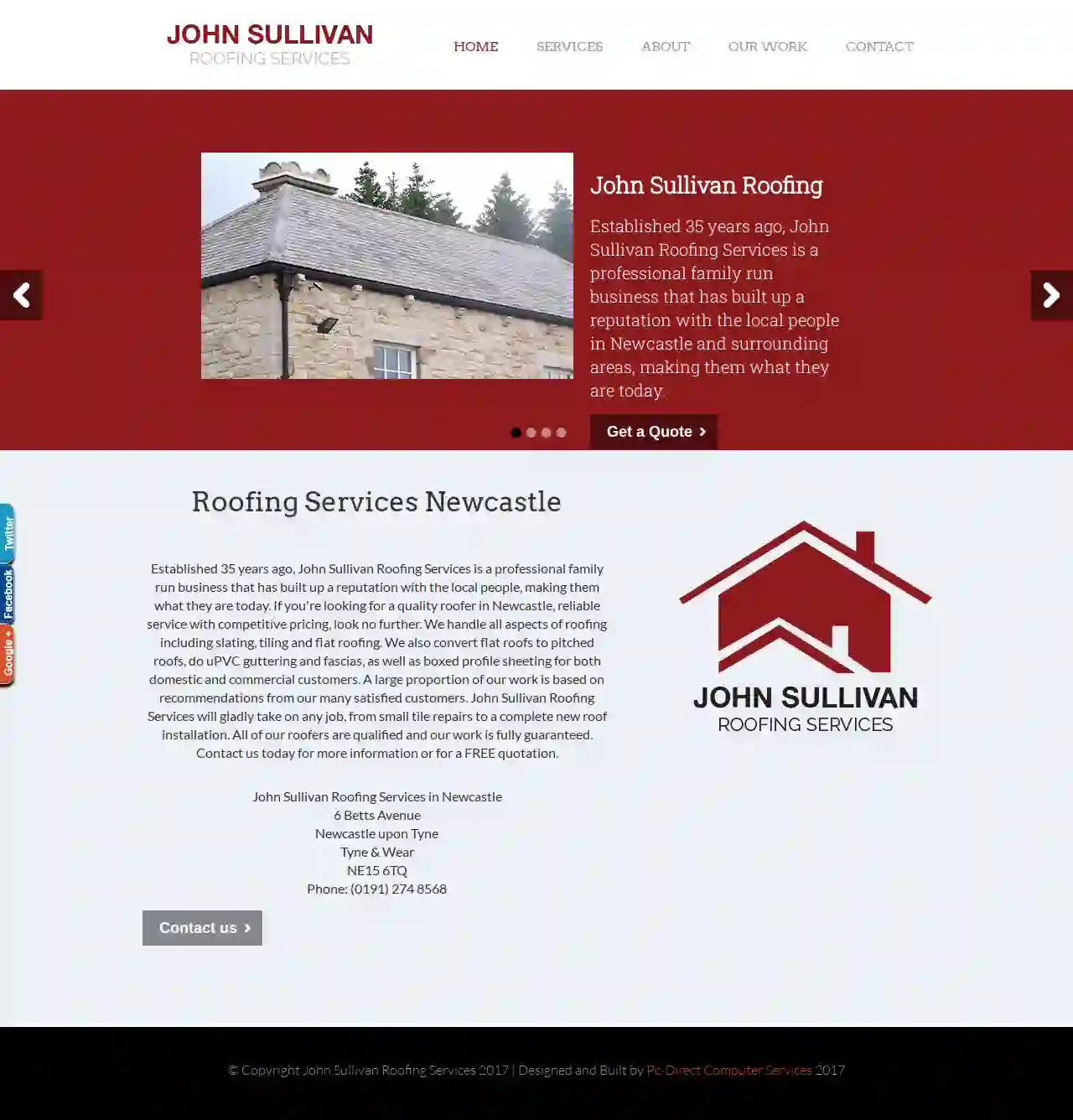Roofing Companies Jarrow
Find Roofing Companies in Jarrow
Get up to 3 Roofing Services quotes for your project today! Compare profiles, reviews, accreditations, portfolio, etc... and choose the best offer.

ShaunCullenRoofing
4.67 reviews31 Whinneyfield Road, Walkergate, Newcastle, NE6 4HU, GBShaun Cullen Roofing Ltd is a family run company based in the Northeast for over 25 years. We are your local roofing experts, proudly serving the Northeast for over 25 years. Our aim is putting the customer first, giving you peace of mind by delivering the highest quality roofing solutions with our qualified tradesmen. We have a vast knowledge and experience to complete all roofing work, whether you require a minor roofing repair or a complete new roof. You can rest assured that you will receive the highest level of service. We always: Provide a free estimate Guarantee a competitive quote Carry out all works quoted for Use only fully qualified tradesmen Fully complete the work to the highest standard Leave your property clean and tidy We are vetted on CheckaTrade.com. To view our profile and some of our reviews please click here.
- Services
- Why Us?
- Accreditations
- Our Team
- Testimonials
- Gallery
Get Quote
RF Roofing Ltd
12 reviews48 Duke Street, Coldstream, TD12 4BS, GBRF Roofing Ltd is a company dedicated to providing high-quality roofing services, specializing in both traditional and eco-friendly roofing solutions. They pride themselves on completing projects to a professional standard, ensuring customer satisfaction. RF Roofing has adapted to new technologies and materials while maintaining traditional values and high-quality standards. They offer a wide range of services covering various aspects of the building trade, from traditional to modern techniques. Their website showcases their expertise and encourages potential clients to contact them for any roofing needs, big or small.
- Services
- Why Us?
- Gallery
Get Quote
RIA Group Building 24/7 Roofing and Plumbing
551 reviewsNewcastle upon Tyne, NE1 1AA, GBFounded by a multi-skilled team in 2005, the RIA Group team has grown in size and experience. The team boasts a diverse range of skills and the experience to undertake the most demanding work and projects. We strive to be professional, reliable, and give clients value for money. RIA Group is proud that the majority of its work comes from client referrals. We attribute this to our client experience, attention to detail, and workmanship. Every project is overseen by our qualified project manager, who is an integral part of our team. Our team members have over 30 years of trading experience in the construction industry. We have established contacts within the sector to provide the highest quality of materials and workmanship.
- Services
- Why Us?
- Gallery
Get Quote
Obsidian Roofing limited
514 reviews46 Barlow Road, London, NW6 2BJ, GBObsidian Roofing is a family run business based in London, with over fifteen years of experience in all aspects of roofing. We look to provide thorough roofing service from full roofs to minor repairs With our free quotes and professional advice, we look to provide the best service in the area. No Job too big, No Job too small.
- Services
- Why Us?
- Gallery
Get Quote- A&
A&R Roofing and Home Improvement Ltd
512 reviewsNewcastle, GBA.R. Roofing Specialist is a roofing company based in the UK. They offer a range of roofing services, including new roofs, roof repairs, and roof maintenance. The company has a team of experienced roofers who are fully qualified and insured.
- Services
- Why Us?
- Gallery
Get Quote 
Slates & Ladders
36 reviewsNewcastle upon Tyne, NE1, GBTyne and Wear Roofing Network is a network of roofing professionals serving the Tyne and Wear area. Our members provide a wide range of roofing services, including roof repairs, flat roofing, pitched roofing, fascias and soffits, and more. We are committed to providing high-quality roofing services at competitive prices. Our team of experienced roofers has the knowledge and expertise to handle all types of roofing projects, big or small. We are fully insured and accredited, so you can be confident that you are in good hands.
- Services
- Why Us?
- Gallery
Get Quote
Burton Roofing Merchants - Newcastle Upon Tyne
4.669 reviewsBenton Square Industrial Estate, Wesley Way, Newcastle upon Tyne, Newcastle, NE12 9TA, GBBurton Roofing is a leading supplier of roofing materials in the UK, with over 35 years of experience in the trade. We offer a wide range of products from over 30,000 lines, all available from stock. Our team of fully trained staff are on hand to provide expert advice and support, whether you're a professional contractor or a DIY enthusiast. We pride ourselves on our commitment to customer service and our competitive prices. With a network of branches across the UK, we're sure to have a depot near you.
- Services
- Why Us?
- Accreditations
- Gallery
Get Quote
John Sullivan Roofing Services
6 Betts Avenue, Newcastle upon Tyne, NE15 6TQ, GBJohn Sullivan Roofing Services is a family-run business established 35 years ago. We've built a strong reputation in Newcastle and the surrounding areas for delivering quality roofing services. Our team of qualified roofers is dedicated to providing reliable service and competitive pricing. We handle all aspects of roofing, including slating, tiling, flat roofing, uPVC guttering and fascias, boxed profile sheeting, and roof conversions. We also offer general building maintenance services. A large portion of our work comes from satisfied customer recommendations. We're happy to take on any job, from small tile repairs to complete new roof installations. All our work is fully guaranteed. Contact us today for a FREE quotation.
- Services
- Why Us?
- Gallery
Get Quote
Real Roofing Ltd
59 reviewsGBReal Roofing Ltd has been supporting the residents and businesses of Newcastle and Gateshead for over 20 years. As a professional Newcastle Roofing Company, we are always on time and our customers are always our number one priority. We provide expert residential and commercial roofing solutions across Newcastle and Gateshead, providing long-lasting roofing solutions that add both beauty and durability to your home. The Real Roofing Company has over 10 years of hands-on roofing experience under Sam Best, who wants to use his 10 years of industry experience to provide customers across Newcastle with the best quality service they deserve. We always strive for complete customer satisfaction and high-quality roofing solutions, every time.
- Services
- Why Us?
- Accreditations
- Our Team
- Testimonials
- Gallery
Get Quote
L.Stewart Roofing
4.58 reviewsNewcastle, GBWELCOME TO L.STEWART ROOFING We are fully insured and highly experienced roofers operating throughout the North East THE IDEAL NORTH EAST CHOICE FOR PROPERTY MAINTENANCE AND IMPROVEMENTS L.Stewart Roofing specialises in all aspects of roofing,UPVC fascia installation and soffits, gutters, re-pointing, chimney repairs and much more. All of our installers are fully vetted, qualified,insured and benefit from our years of experience. We come highly recommended, with most business being refereed to us by our extremely satisfied customers. WHERE DO WE OPERATE? We carry out our services throughout County Durham, Sunderland, Newcastle, Gateshead, Teesside and throughout the North east of England. WHY CHOSE L.STEWART ROOFING? Our high standard of work reflects our 15 years of experience and diligent approach to customer service. Additionally, we have a large catalogue of positive reviews that demonstrates the high standard of all work carried out.
- Services
- Why Us?
- Our Team
- Testimonials
- Gallery
Get Quote
Over 12,314+ Roofers on our directory
Our roofing experts operate in Jarrow & beyond!
Roofyng.co.uk has curated and vetted Top Roofing Companies in and around Jarrow. Find the most trustworthy business today.
Frequently Asked Questions About Roofing Companies
- Roof size and complexity
- Roofing material chosen
- Local labor costs
- Accessibility of the roof
- Removal of existing roofing
- Additional features (skylights, chimneys, etc.)
- Asphalt Shingles: 20-30 years
- Metal Roofing: 40-70 years
- Tile Roofing: 50-100 years or more (clay and slate)
- Flat Roofing: 15-30 years (depending on material)
- Slate: 100 years or more
- Wood Shakes or Shingles: 30-50 years (with proper maintenance)
How much does a new roof cost in the UK?
How long does a roof typically last?
What should I do with my old roof after replacement?
What is fascia, and why is it important?
How much does a new roof cost in the UK?
- Roof size and complexity
- Roofing material chosen
- Local labor costs
- Accessibility of the roof
- Removal of existing roofing
- Additional features (skylights, chimneys, etc.)
How long does a roof typically last?
- Asphalt Shingles: 20-30 years
- Metal Roofing: 40-70 years
- Tile Roofing: 50-100 years or more (clay and slate)
- Flat Roofing: 15-30 years (depending on material)
- Slate: 100 years or more
- Wood Shakes or Shingles: 30-50 years (with proper maintenance)